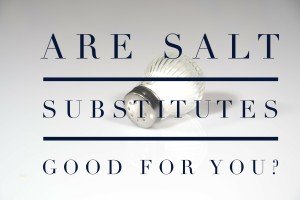 High blood pressure issues require some restrictive dietary needs. Omitting or seriously moderating your sodium intake is one of the most common dietary restrictions for patients with high blood pressure. This is because excess sodium increases the amount of fluid in your body, which puts additional pressure on your heart.
High blood pressure issues require some restrictive dietary needs. Omitting or seriously moderating your sodium intake is one of the most common dietary restrictions for patients with high blood pressure. This is because excess sodium increases the amount of fluid in your body, which puts additional pressure on your heart.
The typical American diet tends to include a seriously excessive amount of salt. This is both because Americans have a taste for salty foods, and because of the overwhelming popularity of processed foods. High blood pressure patients often find it difficult to omit salt from their diets, and sometimes turn to salt substitutions.
The Truth about Salt Substitutes
Salt substitutes are available in just about any grocery store spice aisle, as well as in some health food stores. High blood pressure patients should take caution when using some salt substitutions because of other ingredients that could potentially be just as dangerous as sodium. It is strongly advised that you speak to your doctor before trying to use any of these salt substitutes.
One ingredient that is prevalent among salt substitutes is potassium chloride. This ingredient can have potentially harmful effects for patients that may have other health issues as well as high blood pressure, such as kidney disease. Overall, if your physician says it is safe to use salt substitutes, you should be okay, but still use them in moderation.
Other Alternatives
Another issue with salt substitutes is that they can sometimes have an odd, or almost chemical, taste to them. Luckily, there are plenty of alternatives to using salt and salt substitutes. Some alternatives can give you a taste sensation very similar to salty, but others will lend you an entirely different flavor appeal than salt. Part of adopting a new diet often includes changing the way you think about food and flavors, and seasoning alternatives is a great place to start. You might actually learn to love the natural taste of the foods you are eating and find a new appreciation for food in general.
Acid: Often, if a food tastes like it is missing salt, what it is really missing is the bright acidic taste that salt adds to dishes. On many dishes, you can recreate this flavor sensation by simply squeezing some fresh lemon juice on your dish. This is best done after cooking, as you are eating.
Herbs: Herbs, fresh or dried, are a great and very natural way to add flavor to your meals. Herbs offer something that even salt cannot offer, and that is depth of flavor. Your dishes can be taken to a whole new level with some simple herbs.
Spices: Found in every grocery store, spices are an easy way to punch up any dish and you don’t even need salt to get a great effect. Spices are simple to work with, and you can find lists of what foods go best with different spices just about anywhere.
Salt Free Mixes: Herbs and spices, of course, can be mixed together to create really spectacular flavor boosts for all different foods. You can make this yourself, based on what you like and prefer. Or you can buy salt free mixes in just about any spice aisle.
Watching your salt intake is an important part of maintaining a healthy diet when you have high blood pressure. Salt substitutes might be an option for you, according to your health history and what your doctor says. You can also adopt the use of other seasoning alternatives. Either way, you will be well on your way to a healthier, salt free, diet. For a meal plan click here.
Speak Your Mind